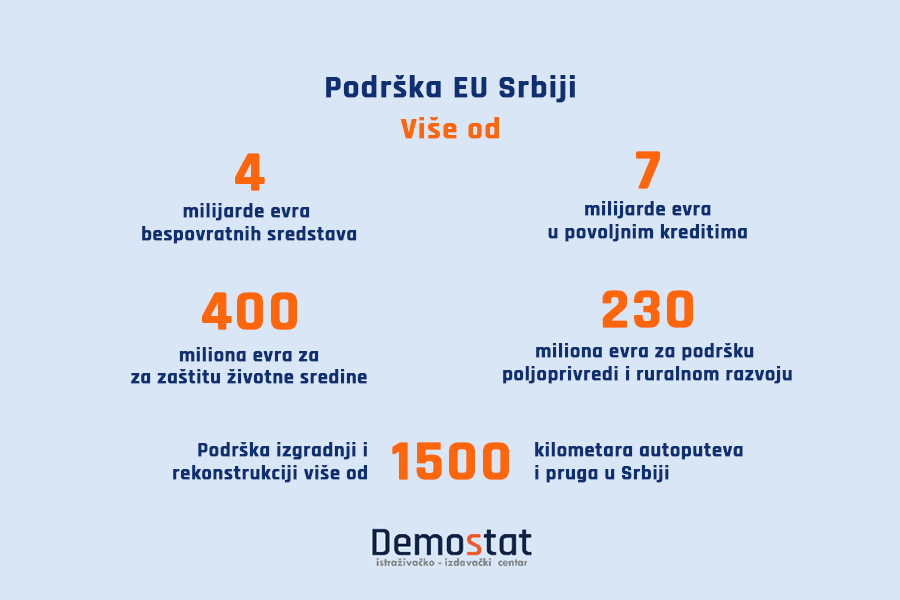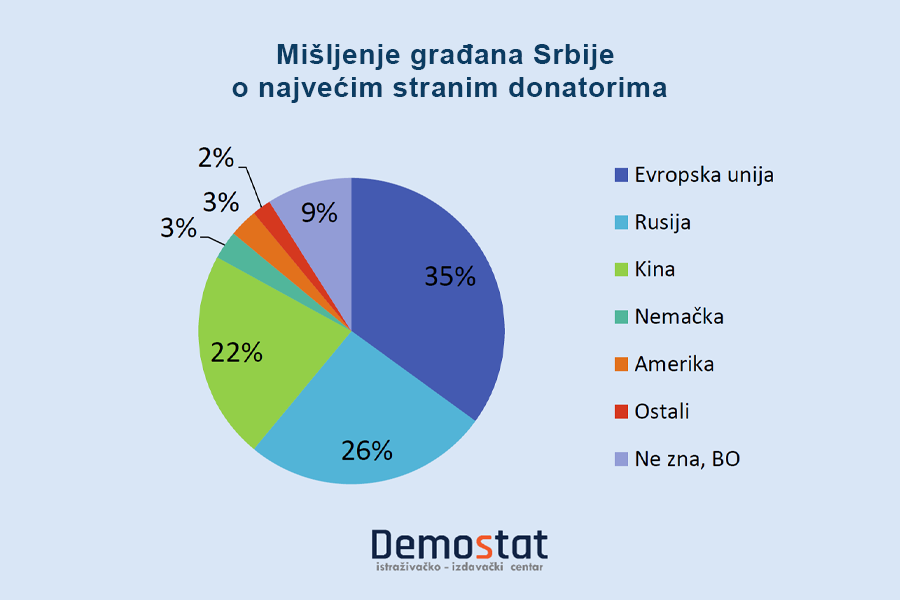Although the European Union has invested more than four billion euros in Serbia in the past ten years, which means better infrastructure, new roads, hospitals, railways, energy corridors, this support is often “swept under the carpet” and neglected by Serbian authorities and media outlets close to it.
The government and the media outlets that favor it whenever they can practically hide from the citizens the concrete effects of European assistance and cooperation with the EU, so that the public remains uninformed about the direct benefit of European money and projects and denied the right to know what Serbias accession to the European Union and the European path brings.
From the reconstruction of the Golubac Fortress to the increase of the population of bald eagles in Serbia, from the introduction of new wastewater treatment plants to support education and Public Administration reform, from digitalization in schools to the modernization of the Belgrade - Nis railway, projects funded by the European Union are successfully launched and developed throughout Serbia.
The total value of Serbian exports to the EU reached a new record in year 2022 and is worth almost 18 billion euros. The European Union has traditionally been Serbias key trading partner, accounting for more than 54% of total trade in goods in 2022.
One in five employees in Serbia works for a company with a majority capital from the European Union, which directly contributes to the budget of Serbia. Regardless of the origin of capital, around 17,700 Serbian companies export part of their products to EU countries, and these companies employ 675,000 workers.

Although the European Union has invested more than four billion euros in Serbia in the past ten years, which means better infrastructure, new roads, hospitals, railways, energy corridors, this support is often “swept under the carpet” and neglected by Serbian authorities and media outlets close to it.
The government and the media outlets that favor it whenever they can practically hide from the citizens the concrete effects of European assistance and cooperation with the EU, so that the public remains uninformed about the direct benefit of European money and projects and denied the right to know what Serbias accession to the European Union and the European path brings.
From the reconstruction of the Golubac Fortress to the increase of the population of bald eagles in Serbia, from the introduction of new wastewater treatment plants to support education and Public Administration reform, from digitalization in schools to the modernization of the Belgrade - Nis railway, projects funded by the European Union are successfully launched and developed throughout Serbia.
The total value of Serbian exports to the EU reached a new record in year 2022 and is worth almost 18 billion euros. The European Union has traditionally been Serbias key trading partner, accounting for more than 54% of total trade in goods in 2022.
One in five employees in Serbia works for a company with a majority capital from the European Union, which directly contributes to the budget of Serbia. Regardless of the origin of capital, around 17,700 Serbian companies export part of their products to EU countries, and these companies employ 675,000 workers.

The European Union is the largest donor in Serbia - in the past ten years, the EU has invested more than four billion euros in grants in over 1,500 projects in almost all municipalities in Serbia, while it has offered more than seven billion euros in favourable concessional loans.
This money is visible to all citizens, as it is used to improve infrastructure, roads and railways, strengthen the rule of law, public administration reform, environmental protection, agriculture, energy, judiciary, culture, public administration, migration management, health protection, democracy and human rights, education, science and innovation, youth and sports, economic development and civil protection, peace and reconciliation.
In the last 15 years, the EU has supported the construction and reconstruction of more than 1,500 kilometers of highways and railways in Serbia through EU grants and loans from the European Investment Bank, while since 2014 it has supported the construction and reconstruction of more than 1,500 kilometers of highways and railways in Serbia. It has provided support to agriculture and rural development in the amount of more than EUR 230 million, and invested more than EUR 400 million in environmental protection.
The construction of air purification plants and the reduction of toxic gas emissions at the Nikola Tesla thermal power plant was financed by the EU, as well as the construction of the Serbia-Bulgaria gas interconnector, waste water treatment plants and sewage system in many cities in Serbia, as well as the construction of an intermodal terminal in Belgrade.
Reconstruction of Golubac Fortress, Pirot City, construction of visitor center in Lepenski Vir, reconstruction of Botanical Garden "Jevremovac" in Belgrade, renovation of the National Theatre in the capital are also some of the projects funded by the EU.
One of the key infrastructure projects is the modernization and reconstruction of the Belgrade-Nis-Presevo railway corridor, which is financed by EU grants, as well as favorable loans from the European Investment Bank and the European bank for Reconstruction and Development.
In the energy sector, the EU has invested more than one billion euros since 2000.
Only in 2022 EU support to the energy sector is estimated at € 100 million, with the main goals being diversification of energy sources, security of supply, energy efficiency and decarbonisation of the economy.
The result is improved energy efficiency for more than 4,500 households, an increase in the number of users who, based on income, can reduce electricity bills, modernization of energy efficiency in hospitals, such as Tirsova, VMA, Emergency Center in Belgrade, wind farm in Kostolac, reconstruction of Vlasina hydroelectric power plants, as well as a new gas interconnector between Serbia and Bulgaria, which will enable Serbia to buy gas from various sources.
The EU in Serbia also encourages the quality of science, through the implementation of numerous research and projects, and the support of the EU to innovation and competitiveness in Serbia since 2001 is more than 250 million euros.
Strengthening the private sector, small and medium-sized enterprises, job creation and improving the legislative framework in this area are also on the agenda of the EU, which provides direct assistance to entrepreneurs, businesses and organizations in 99 local governments, in order to improve sustainability and competitiveness.
EU support to the Civil Protection sector, including fire fighting, flood prevention and damage remediation, as well as the fight against coronavirus, is worth more than € 250 million for the period from 2014 until today.
In addition, through the Erasmus programme students have the option to study abroad, researchers to receive grants from the EU Horizon programme, farmers direct support through IPARD funds.
The European Union also funded housing for some of the refugees who left their homes in the wars of the 1990s.
These are just some of the European Union projects that have been developing in Serbia for more than two decades.
Even though the EU has spent an average of 400 million euros in the past few years on projects supporting Serbias accession to the EU, in the form of grants, as well as through favorable loans, which mean better infrastructure, new roads, hospitals, railways, energy corridors, this support is often “swept under the carpet” and neglected by Serbian authorities and media close to it.
Public opinion polls have shown for years that citizens still believe that the help of other external actors, such as China and Russia, is much higher than it really is, while the funds from the European Union are undervalued.
In the mid 2022 the European Union finally came first in the perception of public opinion on the entities which give the most grants and which invests the most in Serbia.

According to the Demostat 2022 survey, one in three respondents believed that the EU gave the most grants to Serbia. However, a quarter of respondents still believe that Russia has helped the most, and a fifth of them that China is a significant grantee.
The survey also showed that the attitude of public opinion towards Serbias EU accession is the same as the attitude of the government and pro-government media towards the Union.
The current government has been playing a double game for years when it comes to European integration, declaratively calling the EU the main foreign policy goal, while at the same time sending anti-European messages to citizens and glorifying cooperation with Russia and China.
The non-credible commitment of the ruling establishment to the European Union, the anti-Western and pro-Russian propaganda led by the state for many years, and playing with “alternatives” in the foreign policy sense have led to low support of citizens to the European Union.
The government practically hides from the citizens the concrete effects of European assistance and cooperation with the EU whenever it can, from the economic sector to the EU support to the improvement of public administration, education, energy…
These facts are shrouded in anti-Western propaganda or silenced and swept under the carpet.
The pro-government media very often do not mention who is funding or partially funding the project in reports from events concerning EU projects, or, for example, display the flags of the European Union.
In this way, citizens are not informed of the direct benefits of European money and projects.
On the other hand, both in the media and by the authorities, projects financed from Chinese loans are praised, and even billboards appear in Belgrade-thank you notes, but nowhere is it said that Chinese loans are more unfavorable, that the conditions are non-transparent, and that the projects are usually carried out by Chinese companies.
Citizens of Serbia are thus denied the right to know what accession to the European Union brings.
They do not know how much money the EU gives, and how much Serbia could get from it if it became a member.
In addition, citizens are not aware of the fact that the benefits of European integration come not only in the form of money, but also through protected cultural heritage, cleaner air, cleaner water, stronger rule of law and protection of human rights, easier access to health, social and educational services.
Sometimes media reports cannot avoid the fact that the EU has allocated funds, such as a recent tour of the works on the reconstruction of the Nis-Dimitrovgrad railway, when President Aleksandar Vucic said that Serbia would not be able to work on it without the EU and that he wants people to know it.
However, such cases are rare.
In all societies there are issues that are rather being skipped. Certain...
The neoliberal path, started in 2001, has led to especially bad results in Serbi...
For centuries, the region was subsumed within the Ottoman and Hungarian Empires,...
"Serbia has returned to the systemic and anti-systemic position of the political...
In reality, Serbia is closer than ever to NATO. In the course of the last five y...